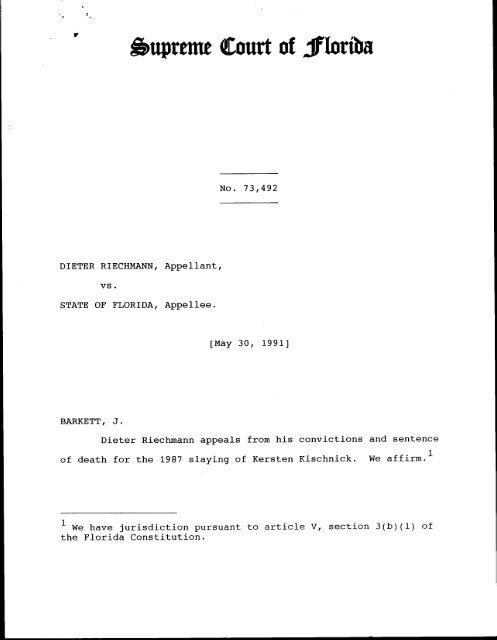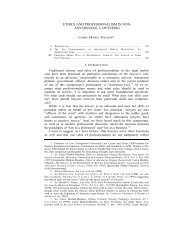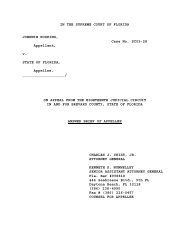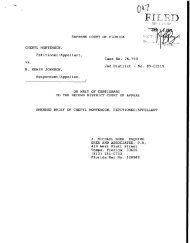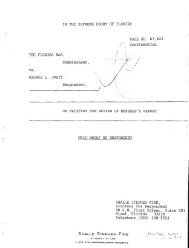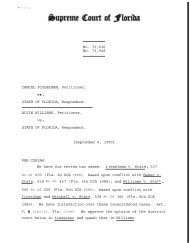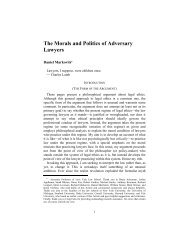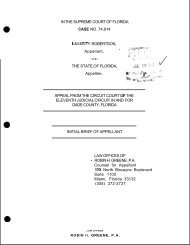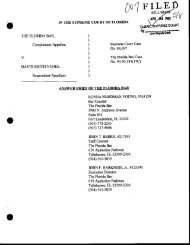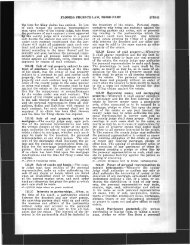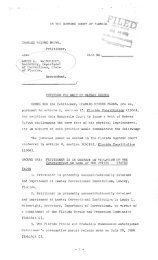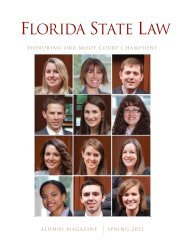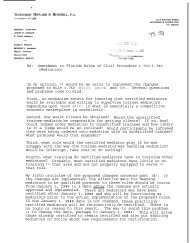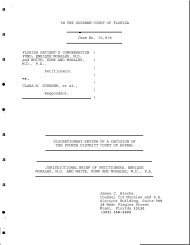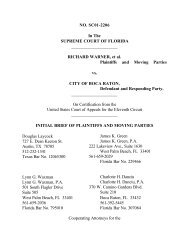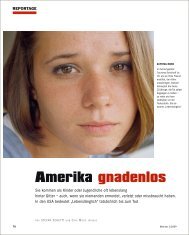No. 73,492 DIETER RIECHMANN, Appellant, vs . STATE OF ...
No. 73,492 DIETER RIECHMANN, Appellant, vs . STATE OF ...
No. 73,492 DIETER RIECHMANN, Appellant, vs . STATE OF ...
You also want an ePaper? Increase the reach of your titles
YUMPU automatically turns print PDFs into web optimized ePapers that Google loves.
<strong>DIETER</strong> <strong>RIECHMANN</strong>, <strong>Appellant</strong>,<br />
<strong>vs</strong> .<br />
<strong>STATE</strong> <strong>OF</strong> FLORIDA, Appellee.<br />
BARKETT, J.<br />
<strong>No</strong>. <strong>73</strong>,<strong>492</strong><br />
[May 30, 19911<br />
Dieter Riechmann appeals from his convictions and sentence<br />
1<br />
of death for the 1987 slaying of Kersten Kischnick. We affirm.<br />
We have jurisdiction pursuant to article V, section 3(b) (1) of<br />
the Florida Constitution.
'<br />
Riechmann and Kischnick, "life companions" of thirteen<br />
years, were German citizens and residents who came to Florida in<br />
early October 1987. Kischnick was shot to death in Miami Beach<br />
on October 25, while she sat in the passenger seat of an<br />
automobile that had been rented and driven by Riechmann. The<br />
state's theory at trial was that Kischnick was a prostitute,<br />
Riechmann was her pimp supported by her income, and when she<br />
decided to quit prostitution, he killed her to recover insurance<br />
proceeds. Relying on circumstantial evidence, the state sought<br />
to prove that Riechmann stood outside the passenger side of the<br />
car and fired a single fatal shot through the partially open<br />
passenger-side window, striking Kischnick above the right ear.<br />
Riechmann has consistently denied committing the crime, asserting<br />
that a stranger shot Kischnick when they stopped the car<br />
somewhere in Miami to ask for directions.<br />
Testimony at trial established that as early as the summer<br />
of 1986 Kischnick became too sick to work and wanted to quit<br />
prostitution. In the months immediately prior to the murder<br />
Kischnick and Riechmann were not getting along, and Riechmann was<br />
often verbally abusive toward Kischnick.<br />
After arriving in Miami from Germany, Riechmann rented an<br />
automobile with his Diner's Club card, which automatically<br />
insured the passengers for double indemnity in the event of<br />
accidental death. On the evening of October 25, Riechmann drove<br />
around the Miami area with Kischnick in the passenger seat. At<br />
some point that evening, Kischnick was shot.<br />
-2-
'.<br />
The evidence at trial included a series of statements<br />
Riechmann made to police during the hours and days that<br />
immediately followed the murder. Riechmann, who spoke broken<br />
English, made his first statement during the investigation at the<br />
scene on October 25. He told officers that when he stopped to<br />
ask directions from a black man, he sensed danger and suddenly<br />
heard an explosion. Realizing that the man had shot Kischnick,<br />
he accelerated the car and drove around Miami in a panic looking<br />
for help. Finally, he spotted Officer Reid and pulled over.<br />
Riechmann made subsequent statements to officers at the police<br />
station, during "drive-arounds" when attempting to help police<br />
find the location of the shooting, and on the telephone. In each<br />
pretrial statement Riechmann told virtually the same story, but<br />
he was unable to recall details of the shooting or where it took<br />
place. Riechmann also told officers that he had not fired a gun<br />
on the day of Kischnick's murder.<br />
In his trial testimony, Riechmann gave a more detailed<br />
a~count.~ Riechmann testified that he and Kischnick had been<br />
touring in their car, intending to videotape some of the Miami<br />
sights. They got lost and asked a stranger for directions. When<br />
Police did not advise Riechmann of his constitutional rights as<br />
enunciated in Miranda v. Arizona, 384 U.S. 436 (1966), until<br />
October 29, after he made numerous statements to officers that<br />
were used against him at trial.<br />
Riechmann testified that he did not give all these details to<br />
police because he was in shock after the murder.<br />
-3-
Riechmann realized they were close to their destination, he<br />
unbuckled his seat belt, reached behind him and grabbed a video<br />
camera, apparently getting prepared to use it. He said he put<br />
the camera on Kischnick's lap and was in the process of handing<br />
her purse to her so she could tip the stranger when he saw the<br />
stranger reach behind him.<br />
"hit the gas pedal" and stretched out his right arm in a<br />
"protective manner," with his palm facing outward in front of<br />
him. Instantly he heard an explosion, accelerated the car, and<br />
saw Kischnick slump over.<br />
for help, driving as many as ten to fifteen miles before he<br />
hailed Officer Reid to get assistance.<br />
Feeling threatened, Riechmann said he<br />
After the shooting he began looking<br />
While questioning Riechmann at the scene, police "swabbed"<br />
his hands for gunpowder residue. An expert for the state,<br />
Gopinath Rao, testified that numerous particles typically found<br />
in gunpowder residue were discovered in the swab of Riechmann's<br />
hand. Based on the number and nature of the particles, Rao<br />
concluded that there is a reasonable scientific probability that<br />
Riechmann had fired a gun.$<br />
Rao also said he would not have<br />
expected to find the same type and number of particles on<br />
Riechmann's hands if Riechmann had merely sat in the driver's<br />
seat while somebody else fired a shot from outside the passenger-<br />
side window. An expert for the defense, Vincent P. Guinn,<br />
Rao also testified that a similar test performed on Kischnick<br />
showed that she had not fired a gun.<br />
-4-
testified that the particles of gunpowder residue found on<br />
Riechmann's hand proved only that Riechmann was in the vicinity<br />
of a gun when it was fired--not that he actually fired a gun--and<br />
that Rao's opinion was not scientifically supported.<br />
In Riechmann's motel room police found three handguns and<br />
forty Winchester silver-tipped, 110-grain, .38-caliber-special<br />
rounds of ammunition in a fifty-shell box. An expert firearms<br />
examiner testified that those bullets were the same type that<br />
killed Kischnick, although none of the weapons found in the room<br />
were used to murder Kischnick. The expert also testified that<br />
the bullet that killed Kischnick could have been fired from any<br />
of three makes of guns. Riechmann owned two of those three makes<br />
of weapons.<br />
The state also presented testimony about the blood found<br />
in the car and on Riechmann's clothes. Serologist David Rhodes<br />
testified that high-velocity blood splatter' found on the driver-<br />
side door inside the car could not have gotten there if the<br />
driver's seat was occupied in a normal driving position when the<br />
shot was fired from outside the passenger-side window. The<br />
pattern of blood found on a blanket that had been folded in the<br />
driver's seat was consistent with high-velocity blood splatter<br />
In simple terms, high-velocity blood splatter is caused when<br />
the great force of energy 0f.a bullet strikes the blood, Rhodes<br />
said. The pattern is characterized by a splatter of blood of<br />
various size droplets including a mist-like spray. Rhodes said<br />
blood splatter caused by the impact of a bullet or aspirated<br />
blood is distinguishable from other causes of blood splatter.<br />
-5-
and aspirated blood, rather than other kinds of blood stains, the<br />
serologist said.6<br />
Blood splatter was found on the steering<br />
wheel, but none was found on Riechmann's seat belt or on the back<br />
of the driver's seat. Additionally, Riechmann had blood stains,<br />
rather than blood splatter, on his clothing. Rhodes testified<br />
that had Riechmann been sitting in the driver's seat during the<br />
shooting, his clothes would have shown evidence of blood splatter<br />
rather than just the blood stains that were found.<br />
Evidence seized by German authorities and brought back to<br />
the United States included numerous documents. Among them were<br />
insurance papers revealing that between approximately 1978 and<br />
1985, Riechmann had become the beneficiary of several German<br />
insurance policies on Kischnick, totalling more than $961,000 in<br />
the event of her accidental death. Under all the policies murder<br />
was considered an accidental death. German documents also showed<br />
that on June 9, 1987, Riechmann and Kischnick filed reciprocal<br />
wills in a German court designating each other as "sole heir" of<br />
their respective estates.<br />
A fellow inmate of Riechmann, Walter Symkowski, testified<br />
that while incarcerated pending trial, Riechmann was pleased with<br />
Riechmann explained that the blood got on the blanket earlier<br />
that summer in Germany after his dog had surgery. When he and<br />
Kischnick took the dog home from the hospital, the dog's surgical<br />
wounds bled on the blanket. He said he brought the blanket with<br />
him to Miami to use on the beach, after which he intended to<br />
discard it.<br />
-6-
the prospect of becoming rich from the proceeds of the insurance<br />
policies and Kischnick's will.<br />
The jury found Riechmann guilty of first-degree murder and<br />
unlawful possession of a firearm while engaged in a criminal<br />
offense. <strong>No</strong> evidence was presented in the penalty phase, and the<br />
jury recommended death by a nine-to-three vote. The court found<br />
the murder was committed for pecuniary gain,7 and was cold,<br />
calculated, and premeditated without any pretense of legal or<br />
moral justification. * Although Riechmann presented no mitigating<br />
evidence, the trial court found as a nonstatutory mitigating<br />
circumstance that people in Germany who know Riechmann told<br />
police they consider him to be a "good person." The trial court<br />
imposed the sentence of death, concluding that "[tlhe aggravating<br />
circumstances far outweigh the nonstatutory mitigating<br />
circumstance.<br />
The first issue we address is-Riechmann's claim that the<br />
trial court should have suppressed his statements both because he<br />
was not apprised of his fifth amendment rights, and because the<br />
statements were coerced by improper and harassing police<br />
procedures. The fifth and fourteenth amendments of the United<br />
States Constitution protect all persons from being compelled to<br />
give testimony against themselves. Because custodial police<br />
§ 921.141(5)(f), Fla. Stat. (1987).<br />
Id. § 921.141(5)(i).<br />
-7-
interrogations are inherently coercive, law enforcement<br />
authorities must advise persons of their constitutional rights<br />
before subjecting them to custodial interrogations. Miranda v.<br />
Arizona, 384 U.S. 436 (1966). However, Miranda does not apply to<br />
questioning outside a custodial situation. E.g., Beckwith v.<br />
United States, 425 U.S. 341, 346 (1976). To determine whether<br />
Miranda applied in this case, the trial court had to ascertain<br />
whether, in view of all the circumstances, a reasonable person in<br />
Riechmann's position would have believed he was not free to leave<br />
when he made the statements. - See, e.g., Michiqan v. Chesternut,<br />
486 U.S. 567, 5<strong>73</strong> (1988); Berkemer v. McCarty, 468 U.S. 420, 442<br />
(1984).<br />
The trial court conducted a lengthy hearing on the motion<br />
to suppress. Much of the evidence was uncontradicted, but there<br />
were distinct conflicts between Riechmann's account and those of<br />
police officers. Riechmann testified that he was distraught;<br />
unable to speak English adequately enough to understand the<br />
questions; and although he had freedom of movement between the<br />
times he made the statements, he was in custody when the<br />
statements were taken. Specifically he points to an occasion<br />
when police placed him in a holding area at the police station<br />
for a period of time9 after the shooting, just prior to making a<br />
There is no question that Riechmann was placed in the holding<br />
area. Riechmann claimed that he was locked in the holding area<br />
for four hours, but police testified that he was there for no<br />
more than one hour.<br />
-8-
statement to Detective Matthews. Conversely, numerous police<br />
officers testified that they considered Riechmann to be merely a<br />
material witness and he was not taken into custody until after he<br />
made the statements at issue; he remained free to walk around the<br />
crime scene perimeter during the investigation; Riechmann was not<br />
handcuffed at the scene or at any time during the investigation;<br />
police did nothing to restrict Riechmann's movements during the<br />
four-day period when the contested statements were made, evinced<br />
by the fact that without consulting with the police, Riechmann<br />
left his motel at will, rented a car, and moved to a different<br />
motel during the period in question; and Riechmann initiated some<br />
of the statements by calling the police himself. As to the<br />
occasion Riechmann was in the holding area, Detective Matthews<br />
apologized to Riechmann and ordered his release immediately when<br />
he discovered that Riechmann had been placed there, apparently by<br />
mistake.<br />
After hearing all the evidence, the trial court resolved<br />
the factual disputes in favor of the state and found that<br />
Riechmann could not have reasonably believed he was in custody<br />
when he made those statements prior to his arrest on October 29.<br />
The record supports the court's decision. There was no abuse of<br />
discretion.<br />
We recognize that even if the interrogation were<br />
noncustodial, overbearing police conduct still could deprive an<br />
accused of the fifth amendment privilege. "When such a claim is<br />
raised, it is the duty of an appellate court, including this<br />
-9-
Court, 'to examine the entire record and make an independent<br />
determination of the ultimate issue of voluntariness.'"<br />
Beckwith, 425 U.S. at 348 (quoting Davis v. <strong>No</strong>rth Carolina, 384<br />
U.S. <strong>73</strong>7, 741-42 (1966)). To the extent that we can judge the<br />
evidence from the record, we conclude the trial court was within<br />
its discretion to find the statements were voluntary and<br />
admissible. 10<br />
Next we address Riechmann's constitutional claims that the<br />
hand swab and physical evidence seized in the searches of his<br />
motel room and rental car should have been suppressed. Riechmann<br />
alleges that the hand swab was coerced, the search warrants were<br />
invalid, police acted in bad faith, and that warrant exceptions<br />
did not apply.<br />
The only alleged contested search conducted without a<br />
warrant was the swabbing of Riechmann's hand at the scene. After<br />
reviewing all the evidence at the suppression hearing, the trial<br />
court concluded that Riechmann consented to the hand swabbing.<br />
The trial court also found that police searched Riechmann's room<br />
and rental car pursuant to validly issued search warrants, and<br />
that the subsequent seizures were proper. The record supports<br />
the trial court's conclusions. Thus, we find no error on these<br />
facts.<br />
lo We also find no error in the trial court's decision not to<br />
suppress Riechmann's post-arrest statements.<br />
-10-
Riechmann also challenges the admissibility of evidence<br />
seized in Germany, arguing that his constitutional rights were<br />
violated' because the searches did not comply with German or<br />
American law. In response, the state urges us to follow United<br />
States v. Verdugo-Urquidez, 110 S.Ct. 1056, 1066 (1990), which<br />
held that the fourth amendment does not apply to the search and<br />
seizure by United States agents of property owned by a<br />
nonresident alien and located in a foreign country when that<br />
nonresident alien has no voluntary attachment to the United<br />
States. Riechmann's claim is not controlled by Verdugo-Urquidez<br />
because Riechmann did have a voluntary attachment to the United<br />
States and thus had greater entitlement to fourth amendment<br />
protection, having assumed the benefits and burdens of American<br />
law when he chose to come to this country. <strong>No</strong>netheless, we<br />
conclude that Riechmann's fourth amendment rights were not<br />
violated. In the suppression hearing, the state showed that<br />
German authorities seized the relevant evidence pursuant to<br />
search warrants lawfully issued by a German court, and Riechmann<br />
presented no competent evidence to challenge the validity of<br />
those warrants or the seizure of evidence relevant to this<br />
case. Probable cause existed to support the German searches on<br />
the facts in this record. We find no constitutional violation.<br />
l1 At the suppression hearing, Riechmann attempted to offer<br />
expert opinion testimony to establish that the German searches<br />
and seizures violated German law. After a voir dire of the<br />
witness, the trial court declined to accept the evidence as<br />
-11-
I<br />
Riechmann next argues that numerous incidents of<br />
prosecutorial misconduct denied him a fair trial.<br />
shows that in many instances Riechmann did not contemporaneously<br />
object. As to those instances when he did object, the court<br />
either properly overruled the objections, or where the objections<br />
were sustained Riechmann did not indicate that sustaining the<br />
objections was not enough to cure the error by following with<br />
appropriate motions to strike, for special instructions, or for a<br />
mistrial. l2<br />
The record<br />
Thus, his claims of prosecutorial misconduct are<br />
meritless or are not preserved for appellate review. See, e.q.,<br />
Holton v. State, 5<strong>73</strong> So.2d 284 (Fla. 1990). In any event, our<br />
independent review of the record persuades us that the alleged<br />
acts of misconduct, individually or collectively, did not deny<br />
Riechmann his right to a fair trial.<br />
expert opinion testimony, ruling that Riechmann failed to qualify<br />
the witness as an expert in the relevant field of German criminal<br />
law. - See gj 90,702, Fla. Stat. (1987). We conclude that the<br />
trial court did not abuse its discretion on the facts in this<br />
record.<br />
l2 We note as an example that the state told jurors Riechmann had<br />
been indicted by "23 grand jurors." Riechmann objected because<br />
the statement was designed to leave an improper implication of<br />
guilt in the minds of the jurors. The trial court correctly<br />
sustained the objection. __ See Dougan v. State, 470 So.2d 697, 701<br />
(Fla. 1985) (an indictment is nothing more than a vehicle to<br />
charge a crime and is not evidence for a jury to consider as any<br />
proof of guilt), cert. denied, 475 U.S. 1098 (1986). Once the<br />
objection was sustained, however, Riechmann did not move to<br />
strike the remark, for a special instruction, or for a mistrial.<br />
-12-
Likewise we reject Riechmann's claim that he was denied a<br />
fair trial due to alleged discovery violations. Riechmann<br />
alleged at trial that the state had failed to provide him with<br />
certain evidence seized by German authorities, including<br />
photographs and documents. The trial court appropriately held a<br />
hearing pursuant to Richardson v. State, 246 So.2d 771 (Fla.<br />
1971), and determined that defense counsel was permitted to<br />
examine this evidence when German police arrived in Florida for<br />
depositions. The trial court's conclusion after the Richardson<br />
hearing, that Riechmann had access to all the documents in<br />
dispute, was supported by the evidence.<br />
Riechmann next claims that the trial court erred in<br />
admitting evidence of four German convictions as impeachment<br />
evidence and in denying his requested instruction to the jury<br />
regarding this evidence. The convictions were: solicitation of<br />
perjury, which occurred in 1974; involuntary manslaughter and<br />
negligent bodily harm connected with a 1972 automobile accident;<br />
grand theft of an automobile stolen in 1966; and forgery, which<br />
occurred in 19<strong>73</strong>. Riechmann argues that the evidence was<br />
inadmissible under sections 90. 6 d 3 and 90. 4 d 4 of the Florida<br />
Statutes (1987). We find merit in one of Riechmann's claims.<br />
l3 Section 90.610 of the Florida Statutes (1987) provides:<br />
90.610 Conviction of certain crimes as<br />
impeachment. --<br />
(1) A party may attack the credibility of<br />
any witness, including an accused, by evidence<br />
-13-
A foreign conviction may be admitted for impeachment in a<br />
Florida court, pursuant to section 90.610(1), provided the<br />
accused has not shown evidence of a lack of fairness in the<br />
foreign justice system. l5 See Alvarez v. State, 467 So.2d 455,<br />
456 (Fla. 3d DCA), review denied, 476 So.2d 675 (Fla. 1985);<br />
that the witness has been convicted of a crime<br />
if the crime was punishable by death or<br />
imprisonment in excess of 1 year under the law<br />
under which he was convicted, or if the crime<br />
involved dishonesty or a false statement<br />
regardless of the punishment, with the following<br />
exceptions:<br />
(a) Evidence of any such conviction is<br />
inadmissible in a civil trial if it is so remote<br />
in time as to have no bearing on the present<br />
character of the witness.<br />
(b) Evidence of juvenile adjudications are<br />
inadmissible under this subsection.<br />
(2) The pendency of an appeal or the<br />
granting of a pardon relating to such crime does<br />
not render evidence of the conviction from which<br />
the appeal was taken or for which the pardon was<br />
granted inadmissible. Evidence of the pendency<br />
of the appeal is admissible.<br />
(3) <strong>No</strong>thing in this section affects the<br />
admissibility of evidence under s. 90.404 or<br />
s. 90.608.<br />
l4 Section 90.403 of the Florida Statutes (1987) provides:<br />
90.403 Exclusion on grounds of prejudice or<br />
confusion.--Relevant evidence is inadmissible if<br />
its probative value is substantially outweighed<br />
by the danger of unfair prejudice, confusion of<br />
issues, misleading the jury, or needless<br />
presentation of cumulative evidence. This<br />
section shall not be construed to mean that<br />
evidence of the existence of available third-<br />
party benefits is inadmissible.<br />
Riechmann made no suggestion that the foreign convictions were<br />
unfair.<br />
-14-
accord United States v. Manafzadeh, 592 F.2d 81, 90 (2d Cir.<br />
1979); United States v. Wilson, 556 F.2d 1177, 1178 (4th Cir.),<br />
cert. denied, 434 U.S. 986 (1977); United States v. Rossi, 219<br />
F.2d 612, 616 (2d Cir.), cert. denied, 349 U.S. 938 (1955).<br />
Riechmann's convictions of solicitation of perjury and forgery<br />
were admissible under section 90.610(1) as crimes of false<br />
statement or dishonesty. So too was the grand theft charge. - See<br />
State v. Paqe, 449 So.2d 813 (Fla. 1984) (crimes involving theft<br />
are crimes of dishonesty under section 90.610(1)).<br />
However, as to the conviction for involuntary manslaughter<br />
and negligent bodily harm, we find the trial court abused its<br />
discretion. Clearly the offense was not a crime involving<br />
dishonesty or a false statement. Thus, the state had to<br />
establish that it was punishable by more than one year of<br />
imprisonment under German law. The state failed to carry its<br />
burden. The record shows that Riechmann had been sentenced to<br />
eight months' probation on that charge, and defense counsel<br />
asserted that Riechmann understood the offense was a misdemeanor<br />
under German law.<br />
The state produced no evidence to establish<br />
that the offense was punishable by more than one year of<br />
imprisonment under German law. <strong>No</strong>netheless, the trial court<br />
ruled the conviction admissible, saying, "In this country it is a<br />
felony. We'll consider it a felony because of this country."<br />
The trial court misapplied the clear and express language of<br />
section 90.610(1), which provides that the offense must be<br />
punishable "by death or imprisonment in excess of 1 year under<br />
-15-
the law under which he was convicted." 8 90.610(1), Fla. Stat.<br />
(emphasis supplied).<br />
between foreign and Florida law.<br />
16<br />
A trial court may not draw blind analogies<br />
<strong>No</strong>netheless, after considering all the facts in this<br />
record, and specifically all of the evidence properly admitted to<br />
impeach Riechmann, l7 we conclude the trial court Is abuse of<br />
discretion in admitting the manslaughter conviction was harmless<br />
beyond a reasonable doubt in accordance with the principles<br />
announced in State v. DiGuilio, 491 So.2d 1129 (Fla. 1986).<br />
The remaining three convictions were admissible pursuant<br />
to section 90.610.<br />
We agree with Riechmann's contention that,<br />
under section 90.403, the nature and remoteness of prior<br />
convictions may create a danger of unfair prejudice substantially<br />
outweighing the probative value of the evidence. __- See<br />
C. Ehrhardt, Florida Evidence 5 610.5, at 346-47 (1984). Section<br />
90.403 bars prior-conviction impeachment evidence "if the<br />
probative value is substantiall-y outweighed by the danger of<br />
l6 In Alvarez v. State, 467 So.2d 455, 456-57 (Fla. 3d DCA),<br />
review denied, 476 So.2d 675 (Fla. 1985), the court said in dicta<br />
that, under section 90.610(1), trial courts may determine whether<br />
or not crimes committed in foreign jurisdictions would be<br />
felonies if committed in Florida. We disapprove Alvarez to the<br />
extent it conflicts with our decision.<br />
l7 We note that the state in cross-examination brought out other<br />
evidence to impeach Riechmann's credibility. For example,<br />
Riechmann admitted he lied in Germany about being an insurance<br />
agent; he cheated German tax authorities; he has been engaged in<br />
an oil and foreign currency business, which he knows may violate<br />
German law; and he admitted to making a "white lie" to get out of<br />
a contract to buy a car.<br />
-16-
unfair prejudice." Page, 449 So.2d at 816. However, applying<br />
these principles to the facts, we do not find error in the<br />
admission of Riechmann's convictions of grand theft, perjury, and<br />
forgery. Justice was best served by allowing jurors to hear that<br />
the man whose critical testimony they were scrutinizing was<br />
convicted of these crimes. Although those offenses were somewhat<br />
remote in time, the trial judge did not abuse his discretion in<br />
concluding that their probative value outweighed the danger of<br />
unfair prejudice.<br />
In a related claim, we find no abuse of discretion in the<br />
trial court's rejection of Riechmann's proposed instruction to<br />
have the jury consider the prior convictions only as impeachment<br />
evidence and not as evidence of guilt. Riechmann's convictions<br />
of forgery and perjury were germane to the issue of Riechmann's<br />
credibility, which bore directly on the ultimate issue of<br />
Riechmann's guilt or innocence.<br />
The last issue worthy of discussion18 is Riechmann's claim<br />
that the evidence of guilt was not legally sufficient to support<br />
the convictions. Florida law requires that when the state relies<br />
on circumstantial evidence to convict the accused, the state must<br />
prove the circumstantial evidence is consistent with the<br />
defendant's guilt and inconsistent with any reasonable hypotheses<br />
of innocence. E.g., State v. Law, 559 So.2d 187, 188 (Fla.<br />
We find no merit in Riechmann's claim that reversal is<br />
mandated "in the interest of justice" because of numerous errors.<br />
-17-
1989); Cox v. State, 555 So.2d 352, 353 (Fla. 1989); Jaramillo v.<br />
State, 417 So.2d 257, 257 (Fla. 1982); McArthur v. State, 351<br />
So.2d 972, 976 n.12 (Fla. 1977); Davis v. State, 90 So.2d 629,<br />
631 (Fla. 1956).<br />
We are satisfied that the state met its burden of proof in<br />
this instance. Bullets recovered from Riechmann's motel room<br />
matched the type used to kill Kischnick. Riechmann possessed two<br />
of the only three types of weapons that could have been used to<br />
kill Kischnick, showing his preference for that particular type<br />
of weapon. An expert testified that particles found on<br />
Riechmann's hands established a reasonable scientific probability<br />
that Riechmann had fired a gun. Evidence of blood splatter and<br />
stains on the car, blanket, and clothes was consistent with the<br />
state's theory of what transpired that night. Insurance<br />
policies, reciprocal wills, and other evidence established a<br />
motive. Meanwhile, the state's scientific evidence about blood<br />
and gunpowder residue was inconsistent with Riechmann's theory of<br />
defense, and the state offered considerable evidence to impeach<br />
Riechmann on the witness stand. Where there were conflicts in<br />
testimony and the theories of the case, the jury had the<br />
prerogative to resolve those conflicts in favor of the state, as<br />
it apparently did. -__ See Law, 559 So.2d at 189 (once the state<br />
introduces substantial competent evidence inconsistent with the<br />
accused's theory of the case, it becomes the jury's duty to<br />
determine whether evidence is sufficient to exclude every<br />
reasonable hypothesis of innocence beyond a reasonable doubt).<br />
-18-
There is substantial competent evidence in the record to<br />
support the convictions. Riechmann makes no claims regarding the<br />
penalty and did not present any evidence in the penalty phase.<br />
The trial court found the death penalty applicable on the basis<br />
that the murder was committed for pecuniary gain and was cold,<br />
calculated, and premeditated. The trial court found as a<br />
nonstatutory mitigating circumstance from the evidence in the<br />
guilt phase that Riechmann's friends and acquaintances told<br />
police he was a "good person." We find the evidence clearly<br />
sufficient to support the aggravating factors applied. In the<br />
absence of any other evidence of mitigation, we find no error in<br />
the trial court's conclusion that "[tlhe aggravating<br />
circumstances far outweigh the nonstatutory mitigating<br />
circumstance." Accordingly, the convictions and sentence of<br />
death are affirmed.<br />
It is so ordered.<br />
SHAW, C.J., and OVERTON, GRIMES, KOGAN and HARDING, JJ., concur.<br />
McDONALD, J., concurs in result only to conviction and concurs<br />
with sentence.<br />
NOT FINAL UNTIL TIME EXPIRES TO FILE REHEARING MOTION AND, IF<br />
FILED, DETERMINED.<br />
-19-
An Appeal from the Circuit Court in and for Dade County,<br />
Harold Solomon, Judge - Case <strong>No</strong>. 87-42355<br />
Lee Weissenborn of the Law Offices of Lee Weissenborn, Miami,<br />
Florida,<br />
for <strong>Appellant</strong><br />
Robert A. Butterworth, Attorney General and Ralph Barreira,<br />
Assistant Attorney General, Miami, Florida,<br />
for Appellee<br />
-20-


